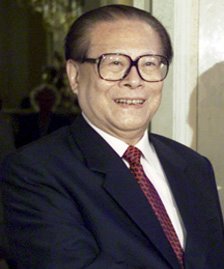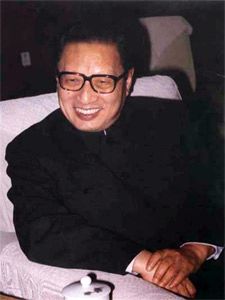
Jiang Zemin is a Chinese retired politician who served as General Secretary of the Communist Party of China from 1989 to 2002 as Chairman of the Central Military Commission of the Communist Party of China from 1989 to 2004 and as President of the People's Republic of China from 1993 to 2003. Jiang has been described as the "core of the third generation" of Communist Party leaders since 1989.

The Standing Committee of the Central Political Bureau of the Communist Party of China, usually known as the Politburo Standing Committee (PSC), is a committee consisting of the top leadership of the Communist Party of China. Historically it has been composed of five to eleven members, and currently has seven members. Its officially mandated purpose is to conduct policy discussions and make decisions on major issues when the Politburo, a larger decision-making body, is not in session. According to the party's Constitution, the General Secretary of the Central Committee must also be a member of the Politburo Standing Committee.
The orders of precedence in China is the ranking of political leaders in China for the purposes of event protocol and to arrange the ordering of names in official news bulletins, both written and televised. It is also sometimes used to assess perceived level of political power. Although there is no formally published ranking, there is usually an established convention and protocol, and the relative positions of Chinese political figures can usually be deduced from the order in meetings and especially by the time and order in which figures are covered by the official media.

The Central Secretariat of the Communist Party of China is a body serving the Politburo of the Communist Party of China and its Standing Committee. The secretariat is mainly responsible for carrying out routine operations of the Politburo and the coordination of organizations and stakeholders to achieve tasks as set out by the Politburo. It is empowered by the Politburo to make routine day-to-day decisions on issues of concern in accordance to the decisions of the Politburo, but it must consult the Politburo on substantive matters.
Since both the Communist Party of China and the People's Liberation Army promote according to seniority, it is possible to discern distinct generations of Chinese leadership. In official discourse, each group of leadership is identified with a distinct extension of the ideology of the party. Historians have studied various periods in the development of the government of the People's Republic of China by reference to these "generations".

Qiao Shi was a Chinese politician and one of the top leaders of the Communist Party of China. He was a member of the party's top decision-making body, the Politburo Standing Committee, from 1987 to 1997. He was a contender for the paramount leadership of China, but lost out to his political rival Jiang Zemin, who assumed the post of General Secretary of the party in 1989. Qiao Shi instead served as Chairman of the National People's Congress, then the third-ranked political position, from 1993 until his retirement in 1998. Compared with his peers, including Jiang Zemin, Qiao Shi adopted a more liberal stance in political and economic policy, promoting the rule of law and market-oriented reform of state-owned enterprises.
The 15th Politburo of the Communist Party of China was elected by the 15th Central Committee of the Communist Party of China on September 19, 1997. It was preceded by the 14th Politburo of the Communist Party of China. It served until 2002.
The 16th Central Committee of the Communist Party of China was in session from 2002 to 2007. It held seven plenary sessions. It was set in motion by the 16th National Congress of the Communist Party of China. The 15th Central Committee preceded it. It was followed by the 17th Central Committee of the Communist Party of China.
The 15th Central Committee of the Communist Party of China was in session from 1997 to 2002. The 14th Central Committee preceded it. The China Democracy Party formed in this period, and was suppressed. It held seven plenary sessions. It was followed by the 16th Central Committee of the Communist Party of China.
The 14th Central Committee of the Communist Party of China was in session from 1992 to 1997. It held seven plenary sessions. It was preceded by the 13th Central Committee. It was elected by the 14th National Congress of the Communist Party of China and in turn elected the 14th Politburo of the Communist Party of China.
The 13th Central Committee of the Communist Party of China was in session from 1987 to 1992. It held seven plenary sessions. It was preceded by the 12th Central Committee and succeeded by the 14th Central Committee. It elected the 13th Politburo of the Communist Party of China in 1987.
The 12th Central Committee of the Communist Party of China was in session from September 1982 to November 1987. It held seven plenary sessions. It was securely succeeded by the 13th Central Committee.
The 11th Central Committee of the Communist Party of China was in a 5 year session from 1977 to 1982. The 10th Central Committee of the Communist Party of China preceded it. It held seven plenary sessions in the 5-year period. It was formally succeeded by the 12th Central Committee of the Communist Party of China.
Events in the year 2003 in China.
Events in the year 2002 in China.
Events in the year 2001 in China.
The following lists events that happened during 2000 in China.

The Central Financial and Economic Affairs Commission, formerly known as the Central Leading Group for Financial and Economic Affairs from 1989–2018, is a commission of the Central Committee of the Communist Party of China at the dependence of the CPC Politburo in charge of leading and supervising economic work of both the CPC Central Committee and the State Council. The Commission is headed by CPC General Secretary or Premier of the State Council.
Events in the year 1999 in China.
The "Three Stresses" campaign was an ideological rectification campaign among Communist Party members in China. The initiative was formally launched in 1998 by then-Communist Party General Secretary Jiang Zemin, and its name refers to the need to “stress study, stress politics, stress righteousness”. The campaign was intended to strengthen discipline within the Communist Party and consolidate support for Jiang Zemin. During the campaign, which spanned from late 1998 to 2000, senior staff within the government, military, party offices, universities, and state and private enterprises were required to spend several weeks engaging in political study and self-criticism sessions with the goal of improving unity and enhancing loyalty to the Communist Party. According to a retired official cited in the New York Times, Jiang also hoped to use the campaign to "identify loyal, promising officials for future leadership positions."